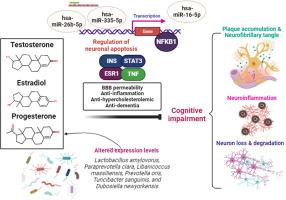The molecular mechanisms of steroid hormone effects on cognitive function
IF 3.5
3区 医学
Q2 GERIATRICS & GERONTOLOGY
引用次数: 0
Abstract
Objective
There is a lack of information on the molecular mechanisms by which steroid hormones (testosterone, estrogen, and progesterone) regulate cognitive impairment. Thus, we aimed to identify the protective effects of steroid hormones on cognitive function.
Methods
We analyzed the literature on the molecular mechanisms, biological activities, physicochemical properties, and pharmacokinetics of steroid hormones.
Results
Steroid hormones can protect against cognitive impairment by regulating key genes (INS, TNF, STAT3, ESR1). Specific microRNAs, namely hsa-miR-335-5p, hsa-miR-16-5p, and hsa-miR-26b-5p, along with transcription factors NFKB1, PPARG, NR3C1, GATA2, EGR1, ATF3, and CEBPA, play a significant role in this protective mechanism. The involvement in cognitive processes, regulation of phosphorylation, neuronal apoptosis, and signaling pathways related to Alzheimer's disease significantly influence the protein-protein interaction network underlying these effects. Additionally, steroid hormones exhibit anti-hypercholesterolemic properties, anti-inflammatory activity, antitoxic properties, and function as inhibitors of acetylcholine neuromuscular transmission. They also hold promise as therapeutic agents for the treatment of dementia. Promising therapeutic interventions for cognitive impairment include the use of miRNA sponges targeting hsa-miR-16-5p, along with the administration of capsaicin, minocycline, dopamine, sertraline, and minaprine. The gut microbiota species Lactobacillus amylovorus, Paraprevotella clara, Libanicoccus massiliensis, Prevotella oris, Turicibacter sanguinis, and Dubosiella newyorkensis were identified as significant contributors to cognitive impairment and altered levels of steroid hormones.
Conclusion
Steroid hormones are promising compounds for improving cognitive function. Further research is needed to validate these findings through focused investigations into apoptosis, regulation of neuronal cell death, miRNA sponges, interactions with gut microbiota, and the potential efficacy of pharmaceutical agents.

类固醇激素影响认知功能的分子机制。
目的:关于类固醇激素(睾酮、雌激素和孕酮)调节认知障碍的分子机制,目前还缺乏相关信息。因此,我们旨在确定类固醇激素对认知功能的保护作用:方法:我们分析了有关类固醇激素的分子机制、生物活性、理化性质和药代动力学的文献:结果:类固醇激素可通过调节关键基因(INS、TNF、STAT3、ESR1)来防止认知功能受损。特定的微RNA,即hsa-miR-335-5p、hsa-miR-16-5p和hsa-miR-26b-5p,以及转录因子NFKB1、PPARG、NR3C1、GATA2、EGR1、ATF3和CEBPA,在这一保护机制中发挥了重要作用。参与认知过程、磷酸化调节、神经元凋亡以及与阿尔茨海默氏症有关的信号通路,都会对这些效应背后的蛋白质-蛋白质相互作用网络产生重大影响。此外,类固醇激素还具有抗高胆固醇血症、抗炎、解毒的特性,并可作为乙酰胆碱神经肌肉传导的抑制剂。它们也有望成为治疗痴呆症的药物。有希望治疗认知障碍的干预措施包括使用针对 hsa-miR-16-5p 的 miRNA 海绵,以及服用辣椒素、米诺环素、多巴胺、舍曲林和米那普林。肠道微生物群物种淀粉乳杆菌(Lactobacillus amylovorus)、克拉拉副杆菌(Paraprevotella clara)、大肠利班尼球菌(Libanicoccus massiliensis)、口腔普雷沃特氏菌(Prevotella oris)、血肠球菌(Turicibacter sanguinis)和纽约杜博氏菌(Dubosiella newyorkensis)被确定为认知障碍和类固醇激素水平改变的重要因素:结论:类固醇激素是有希望改善认知功能的化合物。结论:类固醇激素是一种有望改善认知功能的化合物,需要进一步研究,通过重点调查细胞凋亡、神经元细胞死亡调控、miRNA 海绵、与肠道微生物群的相互作用以及药物的潜在功效来验证这些发现。
本文章由计算机程序翻译,如有差异,请以英文原文为准。
求助全文
约1分钟内获得全文
求助全文
来源期刊
CiteScore
7.30
自引率
5.00%
发文量
198
审稿时长
16 days
期刊介绍:
Archives of Gerontology and Geriatrics provides a medium for the publication of papers from the fields of experimental gerontology and clinical and social geriatrics. The principal aim of the journal is to facilitate the exchange of information between specialists in these three fields of gerontological research. Experimental papers dealing with the basic mechanisms of aging at molecular, cellular, tissue or organ levels will be published.
Clinical papers will be accepted if they provide sufficiently new information or are of fundamental importance for the knowledge of human aging. Purely descriptive clinical papers will be accepted only if the results permit further interpretation. Papers dealing with anti-aging pharmacological preparations in humans are welcome. Papers on the social aspects of geriatrics will be accepted if they are of general interest regarding the epidemiology of aging and the efficiency and working methods of the social organizations for the health care of the elderly.

 求助内容:
求助内容: 应助结果提醒方式:
应助结果提醒方式:


